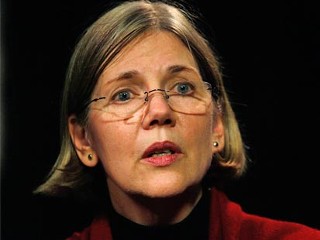 The Atlantic:
The Atlantic: As a Harvard law professor, Elizabeth Warren spent years studying the growing debt burden of the middle class. Through her work, she came to believe that the government should do more to protect ordinary Americans against unscrupulous banks, credit-card companies, and other predatory lenders. “It is impossible to buy a toaster that has a 1-in-5 chance of bursting into flames and burning down your house,” she argued. “But it is possible to refinance an existing home with a mortgage that has the same 1-in-5 chance of putting the family out on the street.” In 2007, to rectify this, Warren proposed that Congress establish a consumer-protection agency for financial products, to mirror the one that alerts consumers about dangerously defective baby cribs and automobiles. The timing was propitious: the housing bubble had just burst, sending the economy careening toward chaos. Her idea was incorporated into the financial reforms that President Obama signed into law this summer.
Warren has become a figure of controversy. Because of her work as a policy innovator, she was appointed to lead the congressional watchdog panel charged with overseeing the Troubled Asset Relief Program—the government’s bailout of the banks and automakers. She has approached the job with tenacity, illuminating the details of frantic backroom deals and subjecting Wall Street bankers and White House officials alike to uncomfortably direct questions about the decisions they made during the crisis. (Her clashes with Treasury Secretary Timothy Geithner have been especially noteworthy.) Like her academic work, Warren’s inquisitions seem to be premised on the conviction that the government should operate first and foremost in the public interest—and seem to be driven by the suspicion, frequently justified, that this has not happened. It’s a sad commentary on our current state of affairs that a robust defense of the American middle class should be seen as radical, and its most visible champion regarded with contempt. But Warren’s approach has earned her many enemies. Not content simply to propose an idea, she lobbied vigorously for the consumer-protection agency, in public forums and in stark language that upset many financial leaders and elected officials. And she won.
No comments:
Post a Comment
Note: Only a member of this blog may post a comment.